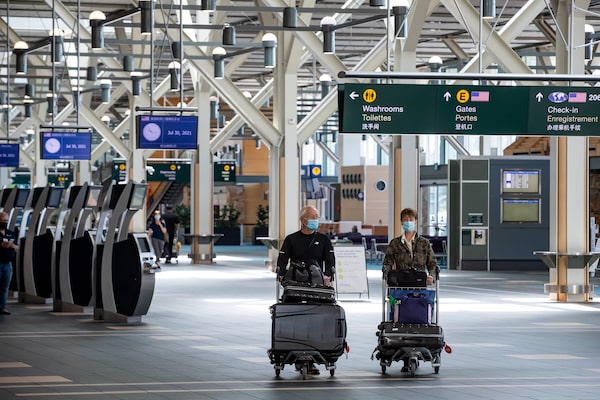
Travellers pushing luggage on carts walk through Vancouver International Airport, in Richmond, B.C., on July 30, 2021.DARRYL DYCK/The Canadian Press
Canada’s move to mix COVID-19 vaccines as part of a strategy to quickly immunize as much of the population as possible could present travel challenges to millions of people who received different doses.
While research has shown that mixing a viral vector vaccine, such as AstraZeneca, followed by an mRNA vaccine, such as Pfizer, produces a significant immune response, some countries, including many in the European Union, don’t recognize certain vaccines and vaccine combinations.
That means that those with mixed doses may not be considered fully vaccinated and could require additional COVID-19 safety measures such as testing and quarantining. Cruise lines can also deny boarding to passengers.
As of Monday, 67.6 per cent of eligible Canadians are fully vaccinated, including about 3.6 million people who received a combination of vaccines.
Conservatives push feds to ensure Canadians who got mixed COVID-19 vaccines can travel abroad
In Ontario, Sid Van Abbema and his family have been cautiously looking to make travel plans since all three members were fully vaccinated.
After having cancelled several family trips because of the pandemic, the plant manager at an automation company booked a Caribbean cruise for February, 2022, departing from Fort Lauderdale, Fla. In the longer term, the family is mulling a trip to Europe, with Denmark as a potential stop.
Mr. Van Abbema received two doses of Pfizer-BioNTech, his wife received AstraZeneca and Covishield, and their daughter received Pfizer and Moderna. Princess Cruises, through which the family booked its trip, does permit mixing vaccines as long as they are the same type – either both mRNA or both viral vector – which means all family members should be permitted to sail.
But Mr. Van Abbema is left wondering about local requirements on the various islands for which shore excursions are scheduled. The Bahamas, for example, does not currently recognize Covishield, the version of the AstraZeneca vaccine produced by the Serum Institute of India that his wife received one dose of. Nor does Denmark, which only accepts vaccines approved by the European Medicines Agency, which are currently Pfizer, Johnson & Johnson, Moderna and AstraZeneca.
“We took the first thing that was offered to us, trying to be good citizens, because we believe in the vaccinations – protecting others as well as for our own protection,” Mr. Van Abbema said. “But travel was going to be part of our long-term plans and this will have an impact for us.”
Last week, Quebec’s Health Department took the unusual step of offering an extra dose of mRNA vaccine as an exceptional measure for people who have an essential trip planned and must meet vaccination requirements. But a spokesman for the department said it is up to recipients to seek advice on the safety of receiving an additional shot.
“The person should be properly counselled to be informed of the potential risks associated with this added dose compared to the benefits of the planned trip,” Robert Maranda said in an e-mail.
While past evidence has shown that additional booster doses of vaccines may be needed when immunity decreases, the National Advisory Committee on Immunization says “there is currently insufficient evidence to identify possible risks to individuals who might receive a third dose of the same or different COVID-19 vaccine.”
No other province is currently offering a third dose. On July 25, Ontario Health Minister Christine Elliott and Solicitor General Sylvia Jones wrote to Minister of Intergovernmental Affairs Dominic LeBlanc saying that those who have had two doses of a Health Canada approved vaccine are considered to be fully immunized and should be treated as such both home and abroad.
“This clarification is important, and we look forward to the outcome of discussions with your American counterparts and those in other jurisdictions, including across the European Union,” the letter said. “We ask the Government of Canada to work with the [World Health Organization] to update its guidance to international partners that mixing vaccines should be internationally accepted as a complete vaccine regimen.”
In British Columbia, Provincial Health Officer Bonnie Henry said the issue “is very much in flux” and urged people to be patient.
“I do expect that as more information becomes available about how safe and effective the different schedules are, countries will be adjusting to accept those schedules,” she said July 27.
In an e-mail, a spokesperson for the World Health Organization (WHO) said that everyone fully vaccinated with any of the vaccines with WHO Emergency Use Listing (EUL) should be treated the same, regardless of which vaccine they received. Regarding mixing, however, the WHO’s Strategic Advisory Group of Experts has currently only granted permissive recommendation to use Pfizer as a second dose, following a first dose of AstraZeneca, if a second dose of AstraZeneca is not available.
“With the exception of the AZ/Pfizer permissive recommendation, there is currently not enough data on the immunogenicity or efficacy of other ‘mix and match’ regimens,” the e-mail said. “The COVID-19 vaccines with EUL have only been assessed as single product regimens.”
The WHO added that countries should be prioritizing limited vaccine supply for first and second doses, and that offering third doses when many countries have yet to even receive a primary series risks exacerbating inequities.
As for Mr. Van Abbema, he says he is primarily glad that he and his family are now fully immunized, and that travel plans are secondary. He’s hoping for more clarity from the cruise line before the November deadline to either pay in full or cancel.
“If I don’t have an answer, then I won’t roll the dice on this,” he said. “Before I put any money out, I want to make sure we can go.”
With a report from the Canadian Press
Our Morning Update and Evening Update newsletters are written by Globe editors, giving you a concise summary of the day’s most important headlines. Sign up today.
 Andrea Woo
Andrea Woo